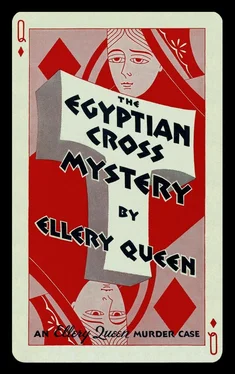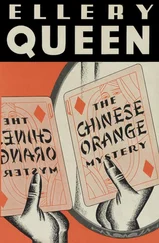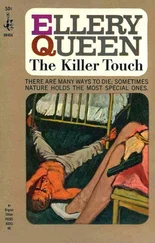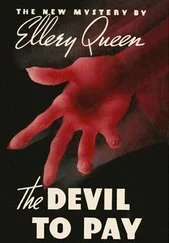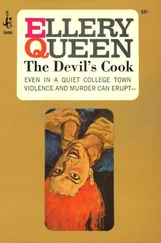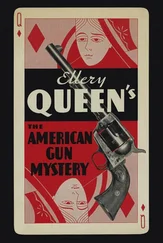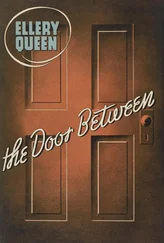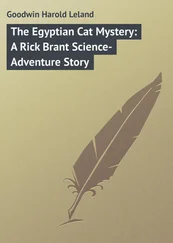“I can see what’s troubling you,” said Ellery thoughtfully. “It’s the horrible complexion of the crimes. Aside from motive, there’s an explanation for that. You will grant two things? For the whole plan to be successful, it was necessary that Andreja Tvar do various unpleasant things — cut people’s heads off (including his brothers’), nail dead hands and feet to makeshift crosses, spill an uncommon quantity of blood... And second, that Andreja Tvar is a madman. He must be. If he was sane when he conceived this grotesque plan, he was insane when he began to carry it out. Then the whole thing clarifies — a madman spills oceans of the divine ichor, part of which comes from the bodies of his own brothers.” Ellery stared at Yardley. “Wherein essentially does the difference lie? You were ready to accept Krosac as a madman — why not Van? The only distinction is the fine one of mutilating strangers as against mutilating brothers. But surely even your unprofessional knowledge of crime includes the sordid stories of husbands incinerating wives, of sisters chopping sisters into little bloody pieces, of sons battering out the brains of their mothers, of incest and degeneracy and every form of intra-familial crime. It’s hard for a normal human being to understand; but you ask my father, or Inspector Vaughn — you’ll hear true stories of atrocities that would make that beard of yours curl up in horror.”
“True,” said Yardley, “I can understand such things even on a basis of repressed sadism. But the motive, my boy, the motive? How the devil could you have known Van’s motive if up to the fourth crime you yourself considered Velja Krosac the culprit?”
“The answer to which,” smiled Ellery, “is that I didn’t know Van’s motive, and that I don’t know it this minute. Actually, what difference does it make? A madman’s motive — it may be as evanescent as air, as hard to crystallize as a pervert’s. When I say madman, of course, I don’t necessarily mean a raving maniac. Van, as you yourself saw, is apparently in full possession of his sanity. His mania is a quirk, a twist in his brain — in everything but one he is sane. My father or Inspector Vaughn can quote you scores of cases in which murderers are apparently as normal as you or I, but actually are the most vicious psychopathic cases.”
“I can tell you the motive,” said Inspector Queen, sighing. “Too bad you weren’t present last night, son, or you, Professor, while the Commissioner and Vaughn, here, had Van on the griddle. Most interesting examination I’ve ever attended. He almost had an epileptic fit, but finally he calmed down and told it — between the curses on the heads of his two brothers.”
“Which, incidentally,” remarked Isham, “he said he had sunk in the Sound with weights. The other heads he buried in the hills.”
“His motive against his brother Tomis — Tomis — Tom,” continued the old man, “was the usual thing — a woman. It seems that in the old country Van had loved a girl, but his brother Tom stole her away from him — the old story. That was Brad’s first wife who, says Van, died through Brad’s ill-treatment. Whether that’s true or not we’ll probably never know; but that’s what he says.”
“And against Megara?” asked Ellery. “He seemed a decent, if saturnine, sort of chap.”
“Well, it’s a little foggy,” replied Vaughn, scowling at his cigar-tip. “It seems that Van was the youngest of the three brothers, and as such wasn’t entitled to any of the old man Tvar’s estate. Seems that Megara and Brad did Van out of his dough, or something. Megara was the eldest, and he controlled the old exchequer. And then they didn’t give Van a cent of the money they stole from the Krosacs — told him he was too young, or something. Did he show them!” Vaughn grinned sardonically. “He couldn’t squeal, of course, because he was in on it. But all this explains why, when the three brothers came to this country, Van broke away from the other two and kept by himself. Brad must have felt a little conscience-stricken, because he left Van that five grand. Fat lot of good it did both of ’em!”
They were all silent for a long time. The Twentieth Century thundered across New York State.
But Professor Yardley was a bulldog. He refused to loosen his grip on his perplexities. He sucked at his pipe for many minutes, turning something over in his mind. Then he said to Ellery: “Tell me this, O Omniscience. Do you believe in coincidence?”
Ellery sprawled on his spine and blew smoke-rings. “The Professor’s in trouble... No, I do not — not in murder, old chap.”
“Then how do you explain the tormenting fact,” demanded Yardley, his pipe waggling in rhythm, “that friend Stryker — another lunatic; heavens! there’s a coincidence in itself! — appeared both on the scene of the Arroyo crime and on the scene of the subsequent crimes so far away? For, since Van is the culprit, poor old Ra-Harakht the sun-god must be innocent... Isn’t his presence in the second murder an appalling coincidence?”
“You’re a valuable companion, Professor. I’m glad you brought that up,” said Ellery briskly, sitting erect. “Of course it wasn’t coincidence, as I explained inferentially the day we had our first talk in your friend’s selamik — how I love that word! Can’t you see the logical inferences from the facts? Krosac was not a myth, he was reality. He learned that one of the Tvars was in Arroyo, West Virginia; it isn’t fanciful to say, therefore, that the same ‘anonymous’ letter which Van wrote also told Krosac where the other Tvars were — Brad in Long Island, Megara living with Brad. There could be no hitch in Van’s own plot; Van knew that Krosac was traveling about with Stryker in Illinois, or even farther west, and that since he had to pass through West Virginia on his way East, he would tackle the schoolmaster first.
“Very well. Krosac,” we must believe, is himself, not altogether the fool. He is going to kill first the Tvar calling himself Andrew Van, and then the Tvars calling themselves Brad and Megara. He knows, too, that the murder of the poor ‘unsuspecting’ schoolmaster, Van, will raise a hullabaloo, and that it will be necessary for him to hide out. Conclusion: why not hide out in the vicinity of his second and third victims’ dwelling? So he looks in the New York papers, finds old Ketcham’s ad for the rental of Oyster Island, gets poor Stryker to agree to go there and start a sun cult, leases the Island by mail long in advance... You see what happens? Krosac is himself murdered. Stryker, le pauvre innocent, aware of none of the nuances, hooks up with equally innocent Romaine, shows Romaine the lease to Oyster Island, and out they go. Which explains the presence of the sun worshipers and nudists on Oyster Island.”
“By God,” exclaimed the Inspector, “Van couldn’t have arranged things better if he wanted Stryker a suspect!”
“And that reminds me,” said the Professor thoughtfully. “That Egyptian business, Queen. You don’t suggest that there was any preconceived plan in Van’s mind to tie up old Stryker’s Egyptology with the murders?”
“Thanks to you,” said Ellery with a grin, “I suggest nothing of the sort. Come to think of it, I made something of an ass of myself on that ‘Egyptian cross’ peroration of mine, didn’t I, Professor?” He sat up suddenly and slapped his thigh. “Dad, a perfectly cataclysmic thought!”
“Listen,” snapped the Inspector, his good humor quite deserting him, “now that I come to think of it, you must have spent half the Queen bank account hiring airplanes and whatnot on that wild and woolly chase of yours up, down, and across country. Do I have to foot the bill?”
Ellery chuckled. “Let me apply logic to the problem. I have one of three courses open. The first is to charge my expenses to Nassau County.” He looked at District Attorney Isham, who, started, began to speak, and finally sank back with an uncomfortable and rather silly grin on his stout face. “No, I see that — to say the least — is impracticable. The second: to stand the loss myself.” He shook his head and pursed his lips. “No, that’s much too philanthropic... I told you I had a cataclysmic thought.”
Читать дальше
